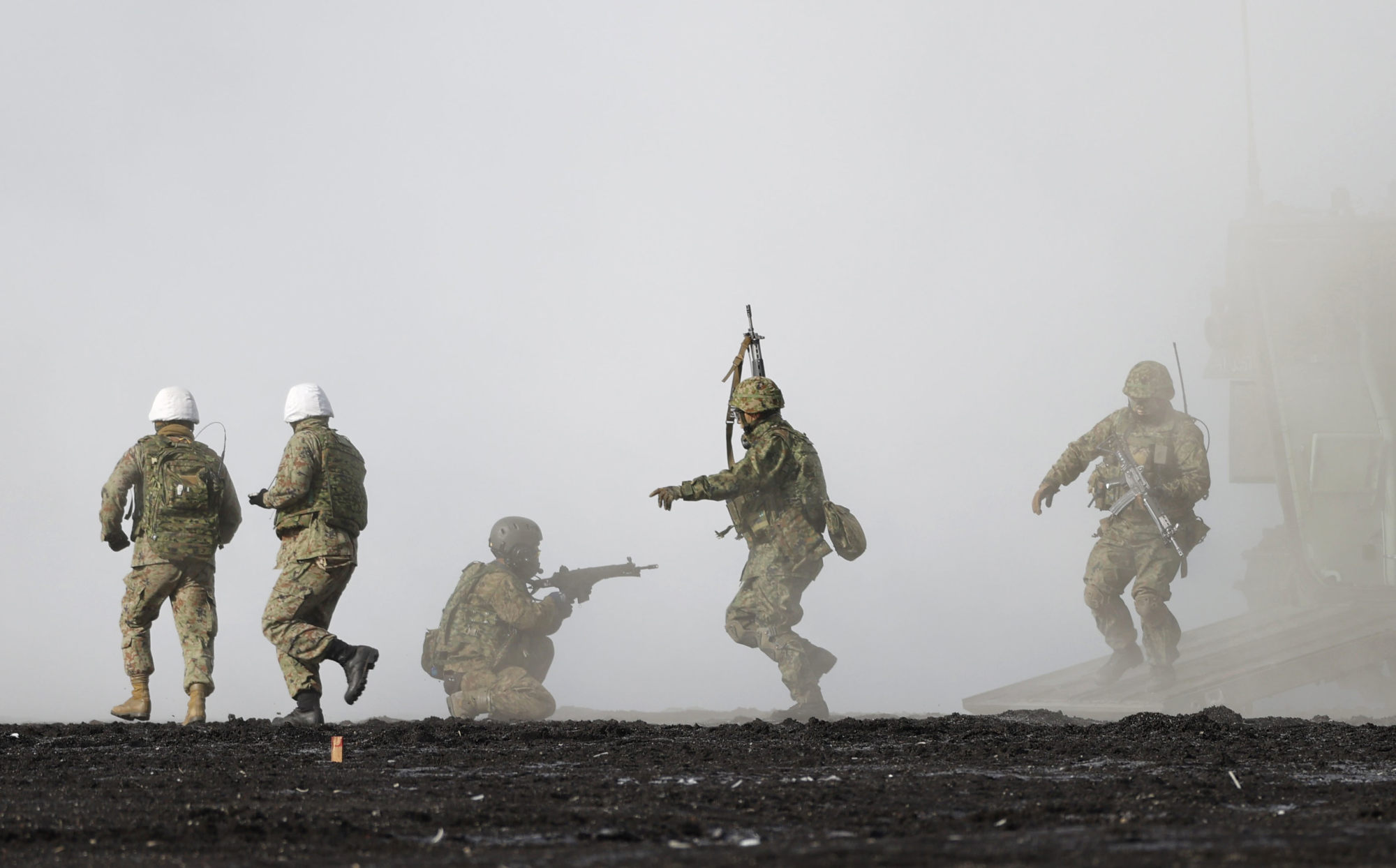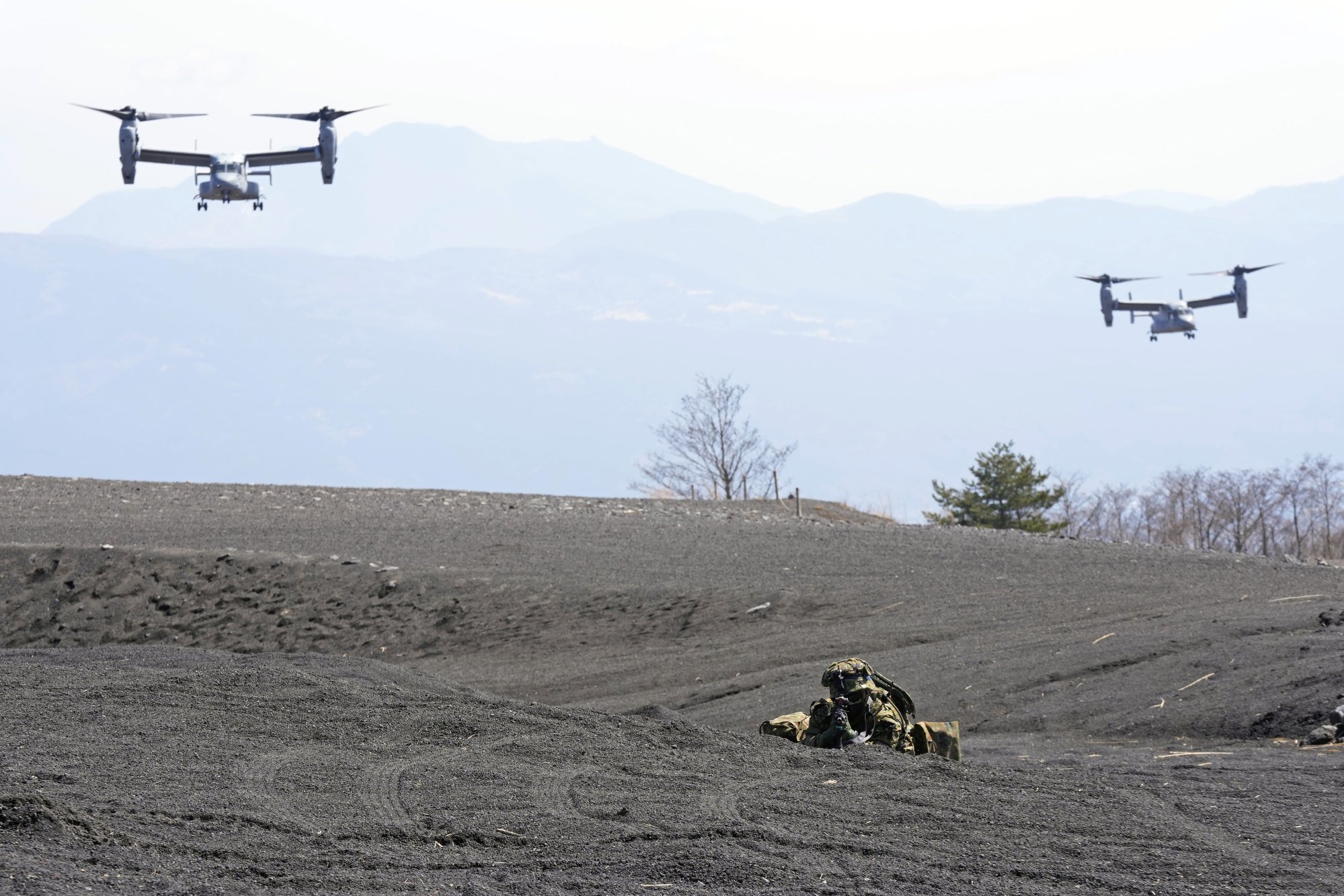
Russia’s invasion of Ukraine has pacifist Japan considering bolstering its military defences
- Almost two-thirds of respondents to a Yomiuri newspaper survey said they wanted to see Japan’s defences strengthened
- Following World War II, Japan placed a clause in its constitution outlawing war as a means to settle international disputes
For years, Japanese voters opposed calls for a stronger defence against the country’s nuclear-armed neighbours. Now, public opinion is shifting, even as obstacles remain to meaningful action to bolster the country’s security.
Russian President Vladimir Putin’s invasion of Ukraine has caused many in Japan to re-examine the chances of armed conflict over East Asia’s unresolved territorial disputes. Polls show voters are worried that a failure to halt Russia could embolden China to take action against Taiwan, which Beijing sees as part of its territory, or to seize disputed East China Sea islands administered by Japan. Tokyo also has a simmering island spat with Moscow.
Following World War II, Japan placed a clause in its constitution outlawing war as a means to settle international disputes.
But, almost two-thirds of respondents to a survey conducted by the Yomiuri newspaper last weekend said they wanted to see Japan’s defences strengthened. National security usually comes a distant second to the economy in voter priorities.

“The Ukraine shock is beginning to change Japan’s norms and beliefs,” said Kyoko Hatakeyama, a professor at the Graduate School of International Studies and Regional Development at the University of Niigata. “But it has a long way to go.”
Although Prime Minister Fumio Kishida surprised many observers by swiftly imposing sanctions on Russia and sending non-lethal military aid to Ukraine, bolstering Japan’s own defences will be more challenging. The ruling Liberal Democratic Party has already stretched interpretations of the country’s pacifist post-war constitution, sometimes in the face of massive public protests.
The LDP must also manage a ruling coalition that includes a Buddhist-backed party and local opposition to military deployments, including the US-made Aegis Ashore missile-defence system. The Japan Self-Defence Forces remain dependent on the “nuclear umbrella” of the US, the country’s only treaty ally.
Japan and Australia slap sanctions on Russia, NZ summons Russian ambassador
Kishida – a one-time dove who came into office warning about a potential confrontation over Taiwan – will face continued pressure to take a more active defence role with US President Joe Biden likely to visit Tokyo in the coming months. That may also require cooling off Japan’s feud with fellow US ally, South Korea, where President-elect Yoon Suk Yeol is urging a greater focus on the region’s security network.
The Japanese premier has his ex-boss, former Prime Minister Shinzo Abe, looking over his shoulder, as well. Abe, who increased defence spending every year during his record-long tenure, has in recent weeks called for steps that would shatter taboos over nuclear weapons or obtaining offensive systems such as missiles.
Abe said last weekend that Japan should obtain the capability to strike at the “centre” of an enemy nation and argued that greater defence spending would help avoid a clash with China. “There’s no nation in the world that will risk lives to defend a country that doesn’t make efforts for its own defence,” he said, according to broadcaster NHK.

Abe previously proposed a debate on “nuclear sharing,” like the system that lets North Atlantic Treaty Organization members host US nuclear weapons. Kishida, who hails from Hiroshima, one of only two cities to have suffered a nuclear attack, shut down the idea, saying it would violate Japan’s principles against possessing, producing or allowing the introduction of atomic weapons.
The Chinese Foreign Ministry said Abe’s nuclear-sharing proposal “fully exposed the dangerous tendency of lingering militarism” in Japan, which invaded the Chinese mainland and ruled Taiwan for half a century as part of its imperial expansion across Asia. Foreign Minister Wang Yi separately reaffirmed China’s commitment to a peaceful resolution over Taiwan, saying last month that the dispute over the democratically ruled island was “not comparable at all” to Ukraine.
Moscow retaliated over Tokyo’s sanctions in recent weeks by cancelling talks on the Kuril Islands, known in Japan as the Northern Territories, which were seized by Soviet forces in the waning days of World War II. Russia also conducted military exercises on the islands.
Japan’s strong Ukraine response could reshape defence strategy as it eyes China
Japanese Defence Minister Nobuo Kishi, told reporters Tuesday that his agency wanted funding for a “drastic” increase to the country’s defences. Kishi, Abe’s brother, called the Nato target of spending 2 per cent of gross domestic product – roughly double Japan’s budget – “meaningful.”
The LDP’s coalition partner, Komeito, is more cautious, rejecting comparisons between Japan and Germany, which has embraced the 2 per cent target.
“We should secure the budget that is actually needed for national security,” Komeito Secretary General Keiichi Ishii said in an interview last week. “Doubling it is impossible. Japan has a debt of more than 1,000 trillion yen (US$8 trillion), so I think the situation is different from other countries.”

Japan has done more than many of its European counterparts to maintain its defences since the end of the Cold War, coming in fifth in the Global Firepower ranking, compared with 16th for Germany.
There’s still plenty Japan can do for its own security by bolstering the US alliance, said Brad Glosserman, visiting professor at the Center for Rule-making Strategies at Tama University in Tokyo. He listed contingency planning on Taiwan, and better cooperation with South Korea as possibilities.
“Every US administration including this one has wanted the Japanese to spend more,” he said. “They’re not going to pull a full Berlin, they’re not going to do that huge jump. But you could see some more money.”

